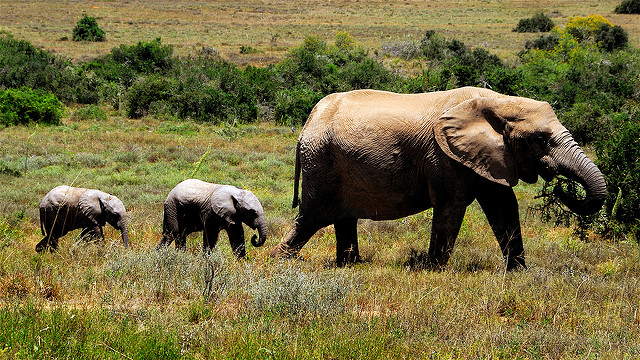South Africa has a concept of “private use” in their copyright law, unlike Australia. This means that I can make a single copy of copyright protected material if it is for my own private use, with no issues at all.

Slack 12. (2007). Elephant twins. Retrieved from https://www.flickr.com/photos/slack12/372349033/
Can I make a copy for someone else’s private use?
Well, looks like (as both a librarian and a lecturer) there are circumstances where I personally could do so. The exceptions seem to be similar to what we have in Australia for librarians, but include other wider cases. The permissions for lecturers (below), however, are far wider. I am not sure where the “can do this 9 times only” figure comes from??? I suspect the same type of calculation that was used by Harper Collins to determine that an ebook would need to be licensed again after being issued 26 times.
Going on the guidelines to legal and ethical use of information from Walter Sisulu University , as a librarian I can:
…copy an article from a journal or anthology or a reasonable portion from any other work and may make a single copy available upon request to:
A library is not permitted to compile a collection of articles or extracts from works in facsimile form, to place such copies on the “reserved” shelf and allow students to duplicate such reproductions. In such cases it is possible for the royalties payable to be set according to the number of students that are registered for the course concerned.
Further, as a lecturer, I would be able to:
make multiple copies of a reasonable portion of a work for him/herself for classroom use, on condition that:
no more than nine (9) instances of such multiple copying occur for a given curriculum for a specific class during one quarter; and that only one copy per student per course is made by or for the lecturer and is used exclusively in the classroom or for class discussions(this includes comprehension exercises and poetry analyses).
When one’s “classroom” is electronic and fully-online then this would get interesting I would think.
South African librarians also spoke of applying to DALRO (Dramatic, Artistic and Literary Rights Organisation) to pay for licenses to put some content into e-Reserve. It seems – and I could be wrong – that it is possible to pay DALRO so that one can put into e-Reserve more than 10% or a single chapter of a work. I am a little fuzzy about this.
All in all, however, seems to be a more workable system for university lecturers/librarians than we have here in Australia.
